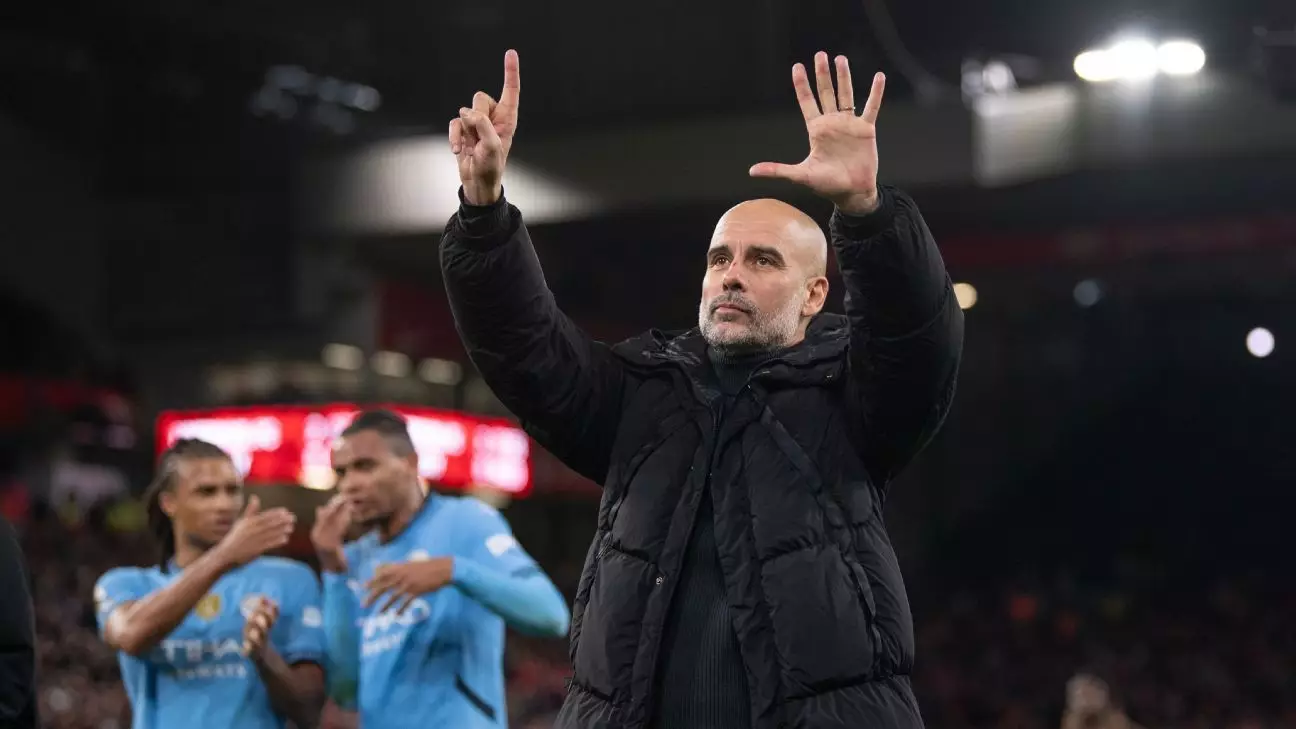The recent 2-0 defeat at the hands of Liverpool has placed Manchester City in an uncomfortable position, casting a shadow over Pep Guardiola’s managerial era. With this loss marking the seventh consecutive game without victory — comprised of six losses, four of which were straight in the Premier League — City finds itself grappling with an identity crisis that challenges its recent successes. The gravity of the situation prompted Guardiola to suggest a need for a complete reset, an assertion that raises concerns about the resilience and future of a club that was once at the pinnacle of English football.
Guardiola’s comments about starting afresh evoke a sense of urgency, underscoring the staggering reality that City now occupies fifth place, trailing Liverpool by nine points at the top of the table. The enduring winless streak is not just a statistical anomaly; it symbolizes a deeper malaise that has gripped the squad. Despite a commendable track record — six Premier League titles in a short span — the current squad faces scrutiny, with a growing sentiment that the team is devoid of the tenacity and cohesion necessary to compete effectively.
Liverpool’s dominance in the match was palpable. Goals from Cody Gakpo and Mohamed Salah, the latter from the penalty spot, showcased a clinical edge that City sorely lacked. Guardiola’s analysis alluded to Liverpool’s intensity, particularly in the opening exchanges. “The first 15, 20 minutes Liverpool were unstoppable,” he noted, a testament to how City has struggled to cope with high-pressure scenarios this season. The stark contrast between both teams’ performances prompts questions about tactical adaptability and physical readiness in a league that is as demanding as it is prestigious.
Guardiola’s confident assertion that “ we can build something” despite overwhelming defeat strikes a noteworthy chord. It depicts a manager bewildered yet unfazed by adversity, perhaps a sign of his steadfast character. Yet, one cannot overlook the weight of expectation that his extensive accolades bring. The taunts from Liverpool fans, including the biting chant of “You’re getting sacked in the morning,” do more than merely reflect rivalry; they manifest the tension between a storied past and an uncertain present.
In what must be painstaking introspection for Guardiola, he reflected on his prior successes, floating a troubling narrative of nostalgia for better times. His metaphor of wine tasting better before aligns metaphorically with a notion that success breeds higher expectations. The very essence of managing a club like Manchester City involves navigating the pressure cooker of leadership — an endeavor complicated further by recent horrid results. “I want the team back, the players back,” he said, expressing a yearning for the previous version of Manchester City that thrilled fans and instilled fear in opponents.
Emotional Tides: Support and Distrust
Guardiola’s candid admission of needing to “accept reality” pushes the conversation towards the emotional state of both the manager and his players. With a backdrop of unwavering support from his family during tough times, it raises questions regarding the emotional support available within the club. Guardiola’s transparent acknowledgment of the challenges beckons for unity and resilience — qualities that will be vital if City is to overturn its fortunes.
However, the path ahead remains fraught with challenges. Lille’s raw power and speed exposed City’s vulnerabilities in transitions; once a hallmark strength, they now appear as glaring weaknesses. Such revelations necessitate a readjustment in strategy and approach — questions loom about the team’s durability against physical opponents and its tactical flexibility in different match scenarios.
The critical juncture City finds itself at might not be unprecedented but poses a unique test of Guardiola’s managerial prowess. With calls for a “reset,” lingering issues around player fitness, cohesion, and tactical effectiveness must be swiftly addressed to salvage the season.
As the City manager noted, he still harbors respect for the rival fanbase, a likely reflection of the mutual competitiveness that shapes English football. “We’ve had incredible battles together,” he said; here lies the essence of football — the inextricable link between rivalry and respect. As Manchester City readies itself for the challenges ahead, it must reclaim its identity while navigating through a storm that has reshaped perceptions within and outside the club.
In the end, Guardiola’s resilience as a leader will be tested more than ever — there lies a delicate balance between exploring the depths of adversity and striving for the heights of success. As Manchester City embarks on this journey of transformation, the course ahead remains unpredictable yet compelling, echoing the rich tapestry of football history.
